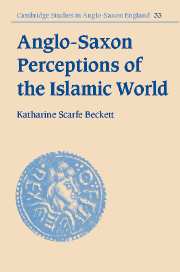Book contents
- Frontmatter
- Contents
- Acknowledgements
- List of abbreviations
- 1 Introduction
- 2 Islam during the Anglo-Saxon period
- 3 Anglo-Saxon contacts with Islam
- 4 Arabs and Arabia in Latin
- 5 Ismaelites and Saracens in Latin
- 6 Arabs, Ismaelites and Saracens in early Anglo-Latin
- 7 Pseudo-Methodius and the sons of Ismael
- 8 Arabs, Ismaelites and Saracens in Old English
- 9 Persisting theories about Saracens in post-Conquest England
- 10 Conclusions
- Bibliography
- Index
1 - Introduction
Published online by Cambridge University Press: 22 September 2009
- Frontmatter
- Contents
- Acknowledgements
- List of abbreviations
- 1 Introduction
- 2 Islam during the Anglo-Saxon period
- 3 Anglo-Saxon contacts with Islam
- 4 Arabs and Arabia in Latin
- 5 Ismaelites and Saracens in Latin
- 6 Arabs, Ismaelites and Saracens in early Anglo-Latin
- 7 Pseudo-Methodius and the sons of Ismael
- 8 Arabs, Ismaelites and Saracens in Old English
- 9 Persisting theories about Saracens in post-Conquest England
- 10 Conclusions
- Bibliography
- Index
Summary
In AD 786, Bishop Georgius of Ostia, papal legate to England, wrote a letter to Pope Hadrian recording the decrees of two synods he had just attended in Mercia and Northumbria. The list of decrees reads unremarkably until the ninth item:
Item nine. That no ecclesiastic shall dare to consume foodstuffs in secret, unless on account of very great illness, since it is hypocrisy and a Saracen practice.
Why does the author introduce the idea of Saracen eating habits? Benjamin Kedar suggests that Georgius or his colleague, Theophylact, had some notion of Muslim fasting practice during the month of Ramadan, when food and drink may only be consumed between dusk and dawn. In the course of the synod, one or the other conveyed this information to the assembly as an example of how not to fast as a Christian. There is no evidence that any Muslim had travelled as far west as England by this time. Arabic was not studied in Christian Europe before the late eleventh century; the Qur'ān was not translated into Latin until the twelfth. The assembled Anglo-Saxon clerics can hardly have had the tenets of Islam at their fingertips. Still, they were able from this synodal decree to understand Saracenus as a pejorative term three centuries before the Crusades.
Within a few years of the synod, Offa, king of Mercia, had a peculiar gold piece struck in his name.
- Type
- Chapter
- Information
- Anglo-Saxon Perceptions of the Islamic World , pp. 1 - 26Publisher: Cambridge University PressPrint publication year: 2003

